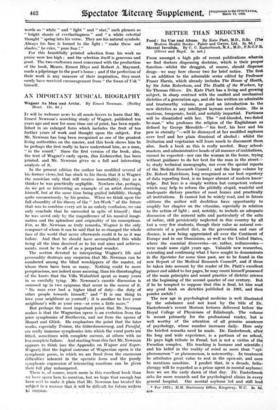BETTER THAN MEDICINE
Food : Its Use and Abuse. By Kate Platt, M.D., B.Sc. (The
Modern Health Books : Faber and Gwyer, Ltd. 2e. &I.) Mental Invalids. By C. C. Easterbrook, M.A., M.D., F.R.C.P.Ig. (Oliver and Boyd. 5s. net.)
Fnom amongst a high pile of recent publications wherein we find doctors dispensing doctrine, which is their proper function—whilst the druggist, of course, should dispense drugs—we may here choose two for brief notice. The first is an addition to the admirable series edited by Professor Fraser Harris, which already includes The House of Health, by Sir John Robertson, and The Health of the Workers, by Sir Thomas Oliver. Dr. Kate Platt has a living and growing subject, in sharp contrast with the ossified and mechanical dietetics of a generation ago, and she has written an admirable and -trustworthy volume, as good an introduction to the new dietetics as any intelligent layman need desire. She is cautious, temperate, lucid, and notably impartial. Partisans will be dissatisfied with her. The " red-blooded, two-fisted he-Anan," who professes the religion of the Englishman as
defined by George Meredith—" his beef, his beer and his pew in eternity "—will be dismayed at her modified raptures over beef and her plain dismissal of alcohol : whilst the fruitarian and vegetarian will learn much to disconcert them, also. Such a book as this is really needed. Busy school-
masters, and administrative heads of all manner of institutions, cannot be expected—nor can the woman in the home, trying without guidance to do her best for the man in the street— to study technical monographs, nor even the special reports of the Medical Research Council ; and the large volume by Dr. Robert Hutchison, long recognized as our best repertory of data regarding food, is no longer abreast of modern know-
ledge. But here is a simply written but competent volume which may help to reform the pitifully stupid, wasteful and inadequate dietary practice of most homes and practically all institutions. It • cannot but be -widely-read, and in future
editions the author will doubtless have opportunity to amplify her chapter on the vitamins, especially in relation to the action of light ; and, notably, to include an adequate discussion of the mineral salts and particularly of the salts of iodine, still persistently neglected in this country by all but a very few students, though their value as natural eon-
stituents of a perfect diet, in the prevention and cure of disease-, is now being appreciated all over- the Continent of Europe and in our Dominions, as well as the United States,
where the essential discoveries—or, rather, rediscoveries— were made some eight years ago. Valuable new researches, extending and confirming what I have sought to demonstrate in the Spectator for some time past, are to be found in the new Report of the Medical Research Council*, and if these be taken into account by the reader of Dr. Platt's excellent primer and added to her pages, he may count himself possessed' of the main principles and sound practice of dietetic science at the beginning of the second quarter of our century. But if he be tempted to suppose that this is final, let him read any good book on dietetics published in 1901, and then ponder awhile !
The new age in psychological medicine is well illustrated by the substance and not least by the title of Dr. Easterbrook's recent Morison lectures delivered before the Royal College of Physicians of Edinburgh. The volume is meant primarily for the professional reader, but is well worthy of the attention of all genuine amateurs of psychology, whose number increases daily. Here only the briefest remarks need be made. Dr. Easterbrook, after his long and wide experience, is a partisan of no school.
He pays high tribute to Freud, but is not a victim of the Freudian complex. His teaching is humane and scientific and his belief in the reality of mind as more than " phenomenon '" or phenomenon, is noteworthy. In treatment he attributes great value to rest in the open-air, and once he mentions sunshine. I predict that, in a decade, helio- therapy will be regarded as a prime agent in mental asylums : here we see the early dawn of that day. Dr. Easterbrook asks for more research and for psychological clinics in every general hospital. Our mental asylums led and still lead
. * For 1925 ; H.M. Stationery Office, Kingaway, W.C. 3s. 6d. the world in humanity : now the prayer of the doctor, as well as of the patient, should be " more brains, 0 Lord." The first step, as was urged in my recent article on another page, is to include psychology in the medical curriculum. When will the General Medical Council find- time, amidst -its other pursuits, to reform and enlighten our medical education ?
CRUSADER.































































 Previous page
Previous page